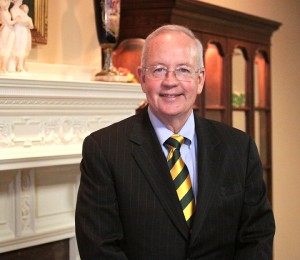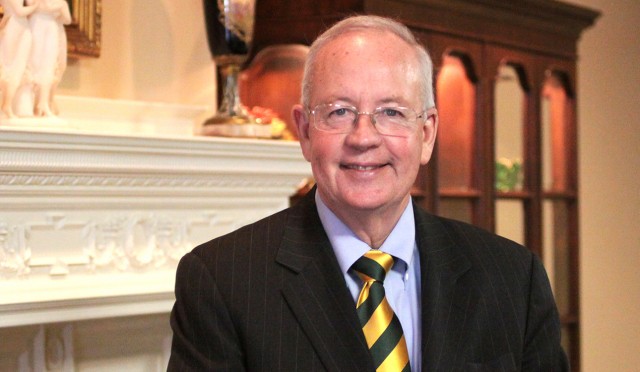
By Jordan Corona
Staff Writer
Hobby Lobby Stores Inc. challenged the U.S. Department for Health and Human Service’s mandate that all employers provide employees contraceptives in accordance with the Affordable Care Act at the U.S. Supreme Court Tuesday.
The case is cause for much controversy and debate and Baylor President and Chancellor Ken Starr sat down with Harvard Law Professor Alan Dershowitz on Monday morning, the day before the hearing, at the Willard Hotel in Washington, D.C., to talk about it.
The university’s Institute for Studies on Religion and Georgetown University’s Berkley Center for Religion, Peace and World Affairs put on the On Topic event, which C-SPAN televised live.
Dershowitz and Starr’s dialogue steered clear of surface level political ideology, quickly setting the bounds of discussion around the legal reality of religious practice and the ordinance of law.
“I come to the problem with much more sympathy to Obamacare and a woman’s right to choose abortion or contraceptives,” Dershowitz said in a interview after Monday’s event. “But legally, I’m sympathetic to the Supreme Court statute to support and protect religious freedom.”
Hobby Lobby’s stance drew from 2010 Supreme Court decision extending certain First Amendment rights to corporations and puts the 1993 Religious Freedom Restoration Act center stage.
David and Barbara Green own the craft-supply store chain and are Christians. The case challenges the healthcare contraceptive mandate on the grounds it pressures the owners to violate sincere beliefs.
Although Starr could not be reached for comment after the On Topic event, his comments in Washington regarded the notion of safeguarding the Religious Freedom Restoration Act. The law establishes a test to prevent enactments that substantially burden an individual’s free religious expression without compelling interest.
“President Clinton signed it into law during his first year in office,” he said. Clinton’s signing address referenced Steven Carter’s book, “The Culture of Disbelief,” which described how American culture has sought to trivialize religion from the public square.
“Religious freedom is our first freedom,” he said, “The Religious Freedom Restoration Act is to protect us as individuals and as corporations.”
Dershowitz was at the Supreme Court hearing Tuesday. He said the Green’s sincerity of belief was unquestionable but there was a hard balance to be struck.
Dialogue like the On Topic discussion, he said, was important.
“It’s very important to see if we can narrow down the differences,” Dershowitz said. “Ken Starr and I start at very different places. He’s more sympathetic to the right-to-life movement; I’m more sympathetic to the right-to-choose. He’s conservative, I’m not. But we narrowed down our differences.



